|
|
|
Sort Order |
|
|
|
Items / Page
|
|
|
|
|
|
|
| Srl | Item |
| 1 |
ID:
093017


|
|
|
|
|
| Publication |
2009.
|
| Summary/Abstract |
In India, there is no comprehensive single security sector reform (SSR) process underway. However, reforms are ongoing in almost all key security sectors. These reforms are self-driven, born at times out of internal analysis, at other times out of domestic pressure resulting from glaring, high-publicity non-performance. The reforms have generally been a reactive process and piecemeal in nature, rather than resulting from long-term strategic planning and needs assessment. Most, if not all, of the security and defence-related reform process has its roots in developments after the nuclear tests of June 1998. Unless these reforms stem from a national strategic planning process, the full benefits of the reforms will be lost.
|
|
|
|
|
|
|
|
|
|
|
|
|
|
|
|
| 2 |
ID:
093022
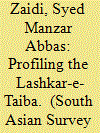

|
|
|
|
|
| Publication |
2009.
|
| Summary/Abstract |
This article profiles the Lashkar-e-Taiba, the Pakistani Jihadist organisation held responsible for the December 2008 terror attacks in Mumbai, India. The article elucidates the ideology, strategic objectives, evolution, organisational structure and methods of indoctrination and training of the organisation. These need to be comprehended in the context of the LeT's terrorist capability. Evidence is given from Jihadist discourse from the Mujallul ud Dawa, the official publication of the LeT.
|
|
|
|
|
|
|
|
|
|
|
|
|
|
|
|
| 3 |
ID:
093021


|
|
|
|
|
| Publication |
2009.
|
| Summary/Abstract |
Security sector reform (SSR) in conflict-ridden countries like Sri Lanka is a challenging task. Currently, the inclination towards the reform process is scant. Apart from absence of political will, there is an immense deficit of institutional and human resources needed to carry out the requisite reforms. However, presence of some positive elements like keenness of international actors in motivating reforms and the inherent democratic nature of the country are encouraging. The article concludes that reforms in the security sector require a serious re-look at establishing a favourable security environment in the long run. To expect peace to stabilise a society without reforming the security sector is wishful thinking
|
|
|
|
|
|
|
|
|
|
|
|
|
|
|
|
| 4 |
ID:
093014


|
|
|
|
|
| Publication |
2009.
|
| Summary/Abstract |
The security sector encompasses those institutions and organisations in the government structure that are responsible for the security of the State and its citizens from external or internal threats. Minimally, these include military and paramilitary forces, the intelligence services, national and local police services, border, customs and coast guards. In order to reduce the risk of conflict, ensure sustainable peace, provide security for citizens and create the right environment for sustainable development, the existence of a capable, responsible and accountable security sector is critical. Effective security sector governance (SSG) involves the optimum management of security institutions within accepted norms of transparency, accountability and observance of humanitarian laws. Transparency and accountability are particularly challenging issues in South Asia. Mistakes made in the past can be avoided if today's democratic governments were to address security issues constructively, by understanding one another's security sectors and sharing knowledge of governance procedures and lessons learnt.
|
|
|
|
|
|
|
|
|
|
|
|
|
|
|
|
| 5 |
ID:
093015
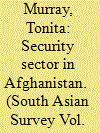

|
|
|
|
|
| Publication |
2009.
|
| Summary/Abstract |
The article presents an overview of the post-Taliban status of the security sector in Afghanistan, particularly the Afghan National Army and police, the courts and judiciary, prisons and security intelligence elements of the security sector. It is argued that uneven distribution of international funding means uneven reform and that if one part of the security sector is neglected in favour of another, all security reform is affected because the institutions are inter-connected. International reform and Western security models are useful but ultimately limited. They can bring about 'hardware' changes but the 'software' changes of culture, values and behaviour can be made only from within. Situating Afghanistan in the historical, cultural and religious context of South Asia and drawing its reform models from this region might be ultimately more effective for the future of Afghan security sector reform than what the present reform phase allows.
|
|
|
|
|
|
|
|
|
|
|
|
|
|
|
|
| 6 |
ID:
093016
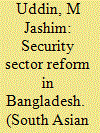

|
|
|
|
|
| Publication |
2009.
|
| Summary/Abstract |
Bangladesh has both external and internal security concerns. As far as internal security is concerned, the list is of some length. It appears that the security sector, especially the police, has not been accountable, transparent and efficient in Bangladesh. Adequate and coherent measures for a holistic reform in the security sector have not been evident in Bangladesh. Moreover, there remains a lack of coordination and accountability even in the reforms undertaken. The effectiveness of any measures taken is further compromised by rampant corruption and bureaucratic lethargy. It is in this context that this article will aim to examine the functionality of the security sector in Bangladesh and the role of oversight mechanisms in making it more accountable to the people. The article will also discuss the key obstacles to reform in the security sector in Bangladesh.
|
|
|
|
|
|
|
|
|
|
|
|
|
|
|
|
| 7 |
ID:
093019
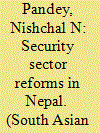

|
|
|
|
|
| Publication |
2009.
|
| Summary/Abstract |
Nepal's security sector is in a state of transition: from an old structural hierarchy in the security, judicial and administrative sectors to a security apparatus that is more democratic, transparent and accountable to the people. While security sector reforms (SSR) are crucial for the political stability of the country, SSR can be successfully implemented only when integrated into the larger government planning framework. To this end, any SSR programme will have to address important issues such as the reform of the Nepal Army (NA), which is perhaps the most important actor in Nepal's security landscape; integration of former Maoist rebels into the NA; and strengthening the Nepal Police and Armed Police Force (APF). Additionally, successful SSR implementation will require the drawing up of a national security policy for Nepal and the adoption of a holistic approach to safeguarding its security interests.
|
|
|
|
|
|
|
|
|
|
|
|
|
|
|
|
| 8 |
ID:
093020
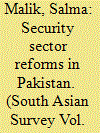

|
|
|
|
|
| Publication |
2009.
|
| Summary/Abstract |
Over the last 60 years, Pakistan has witnessed recurrent political upheavals and security threats that have undermined any attempt in building strong democratic institutions. This is true also of the security sector and governance agencies that are perhaps facing their biggest internal and external security challenge since 2007. The stresses on Pakistan's security sector to protect the country's borders, its people and the nuclear arsenal are unprecedented. In the light of such problems, the article examines the efforts to build various institutions for addressing the country's security challenges as well as the reforms that have been undertaken to strengthen these institutions. The article concludes by recommending certain necessary steps required to establish a holistic security sector in order to safeguard its national interests.
|
|
|
|
|
|
|
|
|
|
|
|
|
|
|
|
|
|
|
|
|